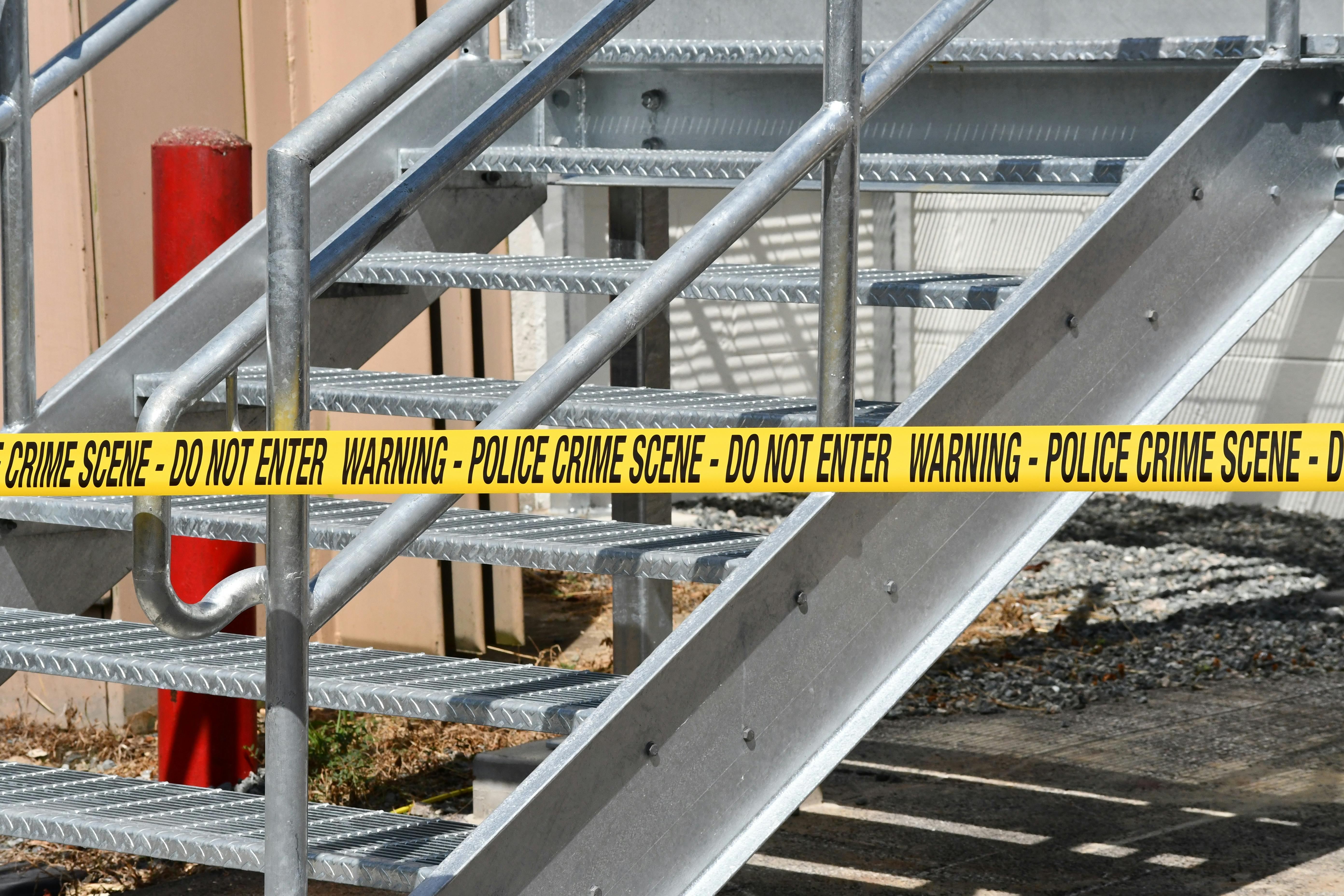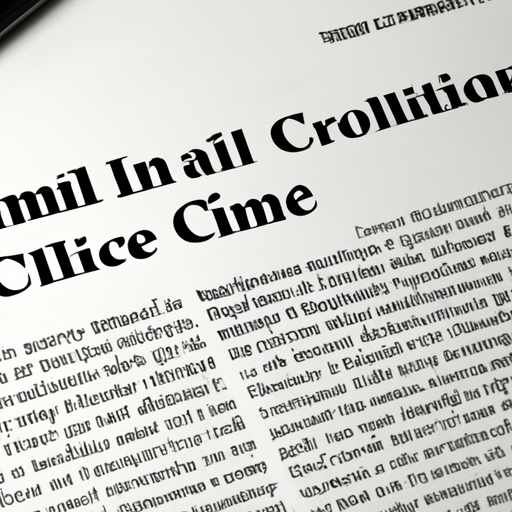Criminal law is a complex aspect of the legal system that encompasses a wide range of offenses and consequences. As a business owner or head of a company, it is crucial to have a solid understanding of criminal law, as it can greatly impact your business operations and the overall well-being of your organization. Whether you are facing criminal charges or simply want to be informed about potential legal risks, consulting with a knowledgeable criminal defense attorney is essential. With their expertise and guidance, you can navigate the intricacies of criminal law and protect your business interests. Don’t wait until it’s too late – call our experienced criminal defense attorney today to ensure the best possible outcome for your company.

Overview of Criminal Law
Criminal law is a branch of law that deals with offenses committed against the public. It encompasses a set of rules and regulations that define conduct prohibited by the government and identifies the corresponding punishment for those found guilty. Understanding criminal law is crucial for both individuals accused of crimes and those seeking to protect their rights in legal matters.
Definition of Criminal Law
Criminal law can be defined as the body of law that deals with crimes and their punishment. Crimes are acts committed against society as a whole, rather than against an individual. These acts are considered harmful or dangerous to the community and are typically prosecuted by the government.
Purpose of Criminal Law
The main purpose of criminal law is to maintain social order and protect the public from harm. It aims to deter individuals from engaging in criminal behavior by imposing penalties for their actions. Additionally, criminal law seeks to rehabilitate offenders, ensuring their reintegration into society and reducing the likelihood of reoffending.
Sources of Criminal Law
Criminal law derives its authority from a variety of sources. The primary sources include statutory law, which is created by legislative bodies, and common law, which is developed through court decisions. Statutory law codifies criminal offenses and establishes the associated penalties, while common law reflects legal principles developed and applied by judges over time.
Classification of Crimes
Crimes can be classified into various categories based on their nature and severity. Understanding these classifications is essential to determine the appropriate legal approach and potential consequences in criminal cases.
Felony vs Misdemeanor
Crimes are generally categorized as either felonies or misdemeanors. Felonies are more serious offenses that are typically punishable by imprisonment for more than one year, while misdemeanors are less severe crimes that carry shorter jail terms or fines.
Violent Crimes
Violent crimes involve the use or threat of physical force against another person or property. Examples of violent crimes include murder, assault, robbery, and domestic violence. These offenses often result in severe consequences and lengthy prison sentences.
Property Crimes
Property crimes involve offenses against someone’s property or possessions. They include theft, burglary, arson, and vandalism. Property crimes can cause significant financial loss and damage to individuals and businesses.
White-Collar Crimes
White-collar crimes are non-violent offenses typically committed by individuals in corporate or professional settings. These crimes are often financially motivated and include fraud, embezzlement, insider trading, and money laundering. White-collar crimes can have far-reaching consequences, impacting both individuals and businesses.
Drug Crimes
Drug crimes involve the possession, distribution, or manufacturing of illegal substances. These crimes can range from simple drug possession to drug trafficking. The severity of drug crimes depends on factors such as the type and quantity of drugs involved.
Sex Crimes
Sex crimes encompass a range of offenses related to sexual conduct. These crimes include rape, sexual assault, child pornography, and prostitution. Sex crimes are taken very seriously and often result in significant penalties and long-term consequences for offenders.
Elements of a Crime
To establish criminal liability, certain elements must be proven beyond a reasonable doubt. These elements define the components of a crime and must be present for a conviction to occur.
Actus Reus
Actus Reus refers to the physical act or conduct that constitutes a crime. It involves a voluntary action or omission, such as stealing or assaulting someone. The actus reus element ensures that a person’s thoughts or intentions alone are not sufficient to establish criminal liability.
Mens Rea
Mens Rea refers to the mental state or intent of the perpetrator at the time the crime was committed. It involves proving that the offender had the necessary mental state to commit the crime, such as an intention to cause harm or knowledge that their actions would lead to illegal consequences.
Concurrence
Concurrence requires that the actus reus and the mens rea of a crime occur at the same time. In other words, there must be a connection between the wrongful act and the criminal intent.
Causation
Causation establishes a causal link between the defendant’s actions and the resulting harm or injury. It must be proven that the defendant’s conduct was the direct cause of the harm suffered by the victim.
Strict Liability Crimes
Strict liability crimes are offenses that do not require the prosecution to prove a mental state or intent on behalf of the defendant. These crimes typically involve acts that are inherently dangerous or harmful, such as certain traffic offenses or selling alcohol to minors. The focus in strict liability crimes is on the act itself, rather than the defendant’s intentions.
The Criminal Justice Process
Understanding the criminal justice process is crucial for individuals facing criminal charges. The process involves several stages, each with its own set of procedures and requirements.
Investigation
The criminal justice process usually begins with an investigation conducted by law enforcement agencies. This stage involves gathering evidence, interviewing witnesses, and collecting information to determine if a crime has occurred and identify potential suspects.
Arrest
Once enough evidence has been gathered, law enforcement officers may make an arrest. An arrest is the physical restraint of an individual by law enforcement with the intention of taking them into custody. The arrested person may be taken to a police station for processing or booked into a detention center.
Charging
After an arrest, the prosecuting attorney reviews the evidence and decides whether to formally charge the individual with a crime. This decision is based on the sufficiency of the evidence and the likelihood of securing a conviction.
Bail and Pretrial Release
If charged, the accused may be eligible for bail, which allows them to be released from custody pending trial. Bail is a monetary guarantee that the defendant will appear in court as required. In some cases, the court may also release the accused on their recognizance, meaning they are released without the need for bail.
Plea Bargaining
Plea bargaining is a negotiation process between the defendant, their attorney, and the prosecutor. It involves the defendant agreeing to plead guilty to a lesser charge or face reduced penalties in exchange for a concession from the prosecution. Plea bargaining is a common practice aimed at resolving cases efficiently and avoiding lengthy trials.
Trial
If the case proceeds to trial, a judge or jury reviews the evidence presented by both the prosecution and defense. The trial process includes opening statements, examination and cross-examination of witnesses, presentation of evidence, and closing arguments. The judge or jury then reaches a verdict based on the evidence and applicable laws.
Sentencing
If the defendant is found guilty at trial or enters a guilty plea, the court proceeds to sentencing. The judge considers various factors, such as the seriousness of the crime, the defendant’s criminal history, and any mitigating circumstances. Sentences can range from fines and probation to imprisonment or even the death penalty in certain jurisdictions.
Appeals
Following a conviction, the defendant has the right to appeal the decision if they believe there were errors or violations of their rights during the trial. The appeals process involves a higher court reviewing the trial record to determine if any errors warrant a new trial or a modification of the original judgment.
Rights of the Accused
The United States Constitution grants individuals certain rights and protections when facing criminal charges. It is essential to understand these rights to ensure a fair and just legal process.
Presumption of Innocence
The presumption of innocence is a fundamental principle in criminal law. It means that a person is considered innocent until proven guilty beyond a reasonable doubt. This principle places the burden of proof on the prosecution to establish the defendant’s guilt.
Right to Counsel
The right to counsel ensures that individuals accused of a crime have the right to legal representation. If the accused cannot afford an attorney, one will be provided at no cost. Legal representation is crucial for protecting the defendant’s rights, advising them throughout the legal process, and building a strong defense strategy.
Right to a Speedy and Public Trial
The right to a speedy and public trial guarantees that individuals accused of a crime have the right to a timely trial and to have the proceedings open to the public. This right helps prevent prolonged periods of pretrial detention and ensures transparency and accountability in the criminal justice system.
Right to Confront Witnesses
The right to confront witnesses allows the accused to confront and cross-examine witnesses testifying against them. This right helps ensure the reliability and credibility of the evidence presented and allows the defense to challenge the prosecution’s case.
Protection Against Self-Incrimination
The Fifth Amendment protects individuals from being compelled to testify against themselves. This protection against self-incrimination allows the accused to remain silent and refuse to answer questions during the trial or other stages of the criminal justice process.
The Role of Criminal Defense Attorneys
Criminal defense attorneys play a vital role in protecting the rights of individuals accused of crimes. Their expertise and knowledge of criminal law are invaluable in navigating the complexities of the legal system.
Importance of Legal Representation
Legal representation is essential for individuals facing criminal charges. Criminal defense attorneys advocate for their clients’ rights, ensure a fair legal process, and work towards achieving the best possible outcome. They understand the nuances of criminal law and have the skills to build a strong defense strategy.
Duties of a Criminal Defense Attorney
Criminal defense attorneys have several key responsibilities. They thoroughly investigate the case, review evidence, interview witnesses, and identify any legal issues or defenses that may apply. They also negotiate with prosecutors to reach plea bargains, represent their clients at trial, and advocate for their best interests.
Building a Strong Defense
Building a strong defense involves challenging the prosecution’s case and presenting evidence and witnesses that support the defendant’s innocence or cast doubt on their guilt. Criminal defense attorneys analyze the evidence, interview witnesses, and consult with experts to build a compelling defense strategy.
Negotiating with Prosecutors
Criminal defense attorneys engage in negotiations with prosecutors to achieve the best possible outcome for their clients. These negotiations may involve plea bargains, where the defendant agrees to plead guilty to a lesser charge in exchange for reduced penalties. Skilled attorneys can often negotiate favorable deals that minimize the potential consequences their clients face.

Criminal Law and Business
Criminal law intersects with various aspects of business operations, requiring businesses to be aware of relevant legal standards and potential liabilities.
Corporate Criminal Liability
Corporate criminal liability holds businesses accountable for criminal acts committed by their employees or agents within the scope of their employment. Businesses can be held liable for various offenses, including fraud, money laundering, and environmental crimes. It is crucial for organizations to implement effective compliance programs and ensure adherence to legal and ethical standards to avoid corporate criminal liability.
White-Collar Crime Defense for Businesses
White-collar crimes can have significant consequences for businesses and their executives. Effective white-collar crime defense involves mitigating reputational damage, navigating regulatory investigations, and mounting a robust defense against criminal charges. Businesses accused of white-collar crimes should seek experienced legal counsel specialized in defending corporate clients.
Employer Liability for Employee Criminal Acts
Employers may be held liable for the criminal acts of their employees under certain circumstances. They have a duty to exercise reasonable care and supervision over their employees’ actions. If an employer fails to prevent criminal activity within the scope of employment or negligently hires an employee with a known criminal history, they may be held liable for the resulting harm.
Defenses in Criminal Law
Various defenses can be raised in criminal cases to challenge the prosecution’s case or mitigate the accused’s liability.
Alibi
An alibi defense involves establishing that the defendant was physically elsewhere at the time the crime was committed. It requires presenting evidence, such as witness testimony, surveillance footage, or electronic records, that places the defendant in a different location when the offense occurred.
Self-Defense
Self-defense is a common defense in cases where the accused used force to protect themselves from imminent harm or danger. The defense requires demonstrating that the use of force was reasonable and necessary under the circumstances.
Insanity Defense
The insanity defense asserts that the defendant lacked the mental capacity to understand their actions or appreciate the wrongfulness of their conduct at the time the crime was committed. The defense usually requires expert testimony and evidence of a severe mental illness or defect.
Intoxication
Intoxication can be used as a defense to specific crimes, particularly those requiring a specific mental state or intent. The defense argues that the defendant’s impaired mental condition due to alcohol or drug use prevented them from forming the necessary intent to commit the offense.
Entrapment
Entrapment occurs when law enforcement officers induce or persuade an individual to commit a crime that they would not have committed otherwise. It involves proving that the defendant was not predisposed to engage in criminal behavior and that the government’s actions were the primary catalyst for the offense.

Criminal Law Procedures
Understanding the procedural aspects of criminal law is crucial for navigating the legal system effectively.
Search and Seizure
Search and seizure refers to the government’s authority to conduct searches, seize evidence, and make arrests. The Fourth Amendment of the United States Constitution protects individuals against unreasonable searches and seizures and requires law enforcement officers to obtain warrants based on probable cause.
Miranda Warnings
Miranda warnings are the rights that law enforcement officers must inform individuals of when taking them into custody or conducting custodial interrogations. These rights include the right to remain silent, the right to an attorney, and the warning that anything they say can be used against them in court.
Grand Juries
Grand juries are panels of citizens that determine whether there is enough evidence to charge a person with a crime. They review evidence presented by the prosecution and determine if there is probable cause to proceed with a trial.
Double Jeopardy
Double jeopardy refers to the protection against being tried or punished twice for the same offense. The Fifth Amendment of the United States Constitution prohibits double jeopardy and ensures that individuals cannot be subjected to multiple trials or punishments for the same criminal act.
Preliminary Hearings
Preliminary hearings are conducted before a judge to determine if there is enough evidence to proceed with a trial. These hearings are typically less formal than trials and provide an opportunity for both parties to present evidence and arguments.
Frequently Asked Questions
What is the punishment for a felony conviction?
The punishment for a felony conviction varies depending on the jurisdiction and the specific offense. Felonies generally carry more severe penalties than misdemeanors and can result in imprisonment for more than one year, substantial fines, probation, or a combination of these.
How can I get my charges dropped?
Getting charges dropped can be challenging, and the process depends on the specific circumstances of each case. It often involves gathering evidence to challenge the prosecution’s case, negotiating with the prosecution for a dismissal, or presenting legal arguments to demonstrate a lack of evidence or constitutional violations.
What is the difference between state and federal crimes?
State crimes are offenses that violate state laws and are prosecuted by state or local authorities. Federal crimes are offenses that violate federal laws and are prosecuted by federal agencies, such as the Federal Bureau of Investigation (FBI) or the Drug Enforcement Administration (DEA). Federal crimes typically involve offenses that cross state lines or have a significant impact on interstate commerce.
Can I appeal a criminal conviction?
Yes, individuals convicted of a crime have the right to appeal their conviction. The appeals process involves a higher court reviewing the trial record to determine if legal errors occurred that warrant overturning the conviction, ordering a new trial, or modifying the original judgment.
What is the role of a prosecutor in a criminal case?
The role of a prosecutor is to represent the government in criminal cases and pursue charges against individuals accused of committing crimes. Prosecutors review evidence, decide whether to charge individuals, present the case to the court, and advocate for the state or federal government to obtain convictions and appropriate sentences.



